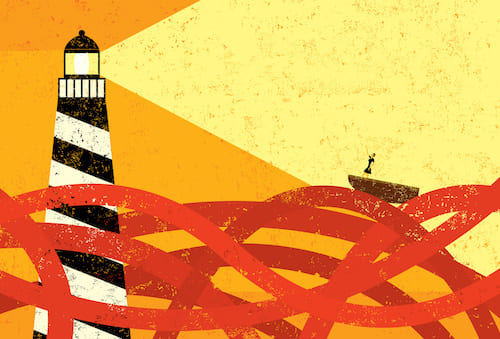
I was a young girl when I started to experience confusing and frightening symptoms. I didn’t tell anyone. I knew my problem wasn’t normal and didn’t think anyone would ever understand. I didn’t dare speak up, in fear of being ridiculed. I thought I could handle it on my own.
It took me twenty years to divulge my secret. I finally went to my doctor and was diagnosed with panic disorder and agoraphobia.
I’m not alone in waiting so long to get medical help. For many, it takes years to tell someone after the first warning signs appear.
The main reason? Stigma.
I was able to hide my panic symptoms. I suffered silently and tried to move on with my life. I graduated from college, got married and had two baby girls. But by my early 30s, my panic attacks became more frequent and more severe.
I was angry with myself because I couldn’t stop the anxiety. My internal monologue wasn’t very kind:
This is stupid. I worry too much. No one else feels this way.
What’s wrong with me?
Maybe it shouldn’t bother me when my heart beats too fast, and I get lightheaded and dizzy. It’s just how I am. So what if I feel sweaty and shaky, and start to black out? I need to be tougher when I think I’m going to faint. I have to calm down when I feel like running out of the place where I’m panicking.
Who does that? Get over it.
It’s the dumbest thing ever that I don’t want to drive because I’m scared of feeling panicky. People get annoyed when they’re stuck in traffic, but their hearts don’t pound and they don’t need to pull over to get hold of themselves.
People would think I’m “crazy” if I told them about feeling disoriented—that sometimes I feel like my body is numb, and I’m awake in a foggy dream. That I get scared from looking at myself in a mirror wondering if the person staring back is really me. Who could possibly know what I’m talking about? I’m so weird.
No matter what I do, I can’t let anyone know. They’ll think I’m strange. I doubt a doctor would know how to help. Maybe I have a brain tumor. I don’t want to scare my family.
Whatever. I’m fine… Usually.
When I look back on how I used to talk to myself, it makes me sad. I was sick and needed help.
Growing up, I’d never heard anyone talk about mental illness. Maybe if I’d had, I would’ve received treatment much earlier.
But I thought I was alone.
It shocked me to learn that I wasn’t.
It took me twenty years to finally talk to my doctor about my symptoms. When my doctor told me I had panic attacks, panic disorder and agoraphobia, I felt a huge sense of relief. Not that I wanted to have those conditions—but I felt validated. I couldn’t believe that those scary sensations I’d had all those years, actually had a name.
I was surprised there was medication that might help me. I was even more amazed when the antidepressant worked.
My daughter Talee was 10 years old when she started to show signs of panic attacks. It broke my heart to know that she had to deal with the same terrifying symptoms that I’d had.
Even though I’d been through it myself and knew that millions of others had anxiety, I still felt the stigma. We both did. Talee did not want her friends to know. She didn’t want them to think she was strange or different. I didn’t want Talee’s teacher or the other parents to know. I didn’t want my daughter labeled.
But I was not going to let my sweet girl suffer in silence and secrecy, as I’d had. I pushed the stigma aside with all my might and got her medical help.
Back then, I didn’t think it was possible for the stigma to lessen. I didn’t think people would ever speak openly about their mental health issues. But they are. I’m grateful that mental illness is finally being acknowledged as a real medical condition that cannot be ignored.
The more that people talk about it, the less taboo it will be for future generations. We’re heading in the right direction, as many schools now offer courses in mental health. In-school awareness programs, such as NAMI’s Ending the Silence, teach high school students the warning signs of mental illness, and what to do if they notice those symptoms in themselves or a friend.
We must keep the conversation going. People need to know there’s help available and there is hope.
There’s no shame in having a mental health condition.
The shame is in the stigma.
Jenny Marie is a mental health advocate and blogger. Jenny is married and has two daughters. Her blog is called Peace from Panic.
We’re always accepting submissions to the NAMI Blog! We feature the latest research, stories of recovery, ways to end stigma and strategies for living well with mental illness. Most importantly: We feature your voices.
Check out our Submission Guidelines for more information.


